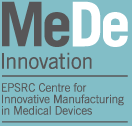National Capability Database | Capability Detail
Professor Phil Coates
p.d.coates@bradford.ac.uk
Micromoulding of high precision miniature products with specific surface features
Capability Description
A second case of our ‘Process Structuring’ is micromoulding – high speed, high precision moulding of 3-d components typically with large surface area to volume ratios. The Polymer IRC at Bradford houses the international Polymer Micro & Nano Technology laboratory with Wittman Battenfeld MicroPower (x2, each 15 tonne clamp force) and Microsystem (x3, each 5 tonne clamp force) machines for polymer melt micromoulding (each capable of up to 1g shot size), plus an Ultrasion ultrasonic moulding machine (~1g shot) and 3 Fanuc servoelectric conventional moulding machines for high speed injection (5, 30 and 100 tonne clamp forces). A wide range of moulds is available for these machines, including sapphire windowed moulds – the mould surface can be selected to achieve required surface features (e.g. surface patterns or roughness) which can influence product functionality, including for example, cell behaviour.
Note that the technology is also applicable to thin-walled moulding of larger products (using the Fanuc machines).
We have extensive in-process measurement capabilities for micromoulding, including ultra high speed optical and thermal imaging, and ultrasound.
Extensive material/ product characterisation includes confocal laser microscopy (CLM) and white light interferometry for surface feature measurement; 3-d AFM with CLM, Raman surface mapping, micromechanical testing over a wide force range (Bose and Biomomentum); being installed: TEM, SEM, WAXS, SAXS
We also underake unique high strain rate rheometry, to determine the effects of extreme process conditions on the materials being processed.
[Dr B Whiteside, Prof P D Coates, Dr C Grant, Dr P Twigg]
Case Study
Companies exploiting our technology include: DRFP Ltd – high precision, heavily filled polymer dental root canal filling – made commercially in our laboratory (prior to a hydrophilic coating elsewhere): winner Medical Excellence Awards, 2011 (USA); Network Medical: eye surgery device manufactured; Relevant companies exploring this approach include Invibio, Smith & Nephew, PPE. We have a patent with Sichuan University for conducting polyurethane-carbon nanotube materials, which exhibit controlled conductivity (potential medical use) and have also demonstrated shape memory features for these materials, with possible electrical triggering.
Line Break







